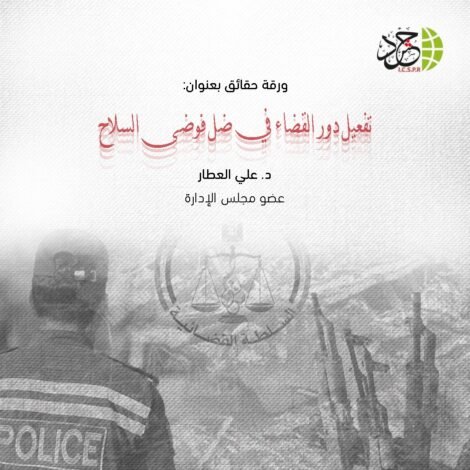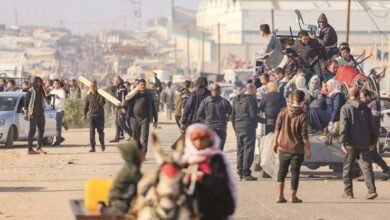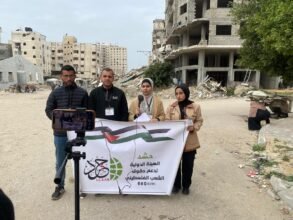
ICSPR Issues Policy Paper Activating the Role of the Palestinian Judiciary Amid Weapon Chaos and the Effects of the Israeli War on the Gaza Strip
Date: November 1, 2025
Press Release
ICSPR Issues Policy Paper: Activating the Role of the Palestinian Judiciary Amid Weapon Chaos and the Effects of the Israeli War on the Gaza Strip
The International Commission for Supporting the Rights of the Palestinian People (ICSPR) issued a detailed policy paper titled: “Activating the Role of the Judiciary Amid Weapon Chaos”, prepared by Dr. Ali Al-Attar, Board Member. The paper thoroughly analyzes the impact of the suspension of judicial work in Gaza during the Israeli war on the stability of society and the legal system, and proposes practical mechanisms to reactivate the Palestinian judiciary to ensure fair trials and strengthen the rule of law.
Since the outbreak of the Israeli war on Gaza and the accompanying destruction of institutional infrastructure and collapse of state facilities, the Supreme Judicial Council announced the suspension of court work until further notice. Amid the ongoing war, alarming internal phenomena emerged, including increased crime rates, the spread of weapons outside legal frameworks, and the growing role of armed groups exercising unauthorized judicial and security powers. This situation led to a decline in public trust in justice institutions and disrupted the principle of the rule of law.
This paper aims to analyze the consequences of suspending judicial work during the war, identify the associated risks, and propose practical mechanisms to reactivate the Palestinian judiciary.
Section One: Consequences of Suspending Judicial Work and Risks Facing the Judiciary During the War
A. Consequences of Judicial Suspension
The suspension of judicial work had severe negative impacts on the Palestinian legal and social fabric, including:
-
Proliferation of vigilante justice: The absence of judicial authority forced citizens to use force to reclaim their rights, fostering a culture of revenge and weakening official law enforcement institutions.
-
Legitimization of parallel violence: Armed groups justified the use of force under the pretexts of “community security” or “revolutionary courts,” without any legal basis or judicial oversight, threatening social stability.
-
Violation of the principle of fair trial: Field executions and arrests outside judicial frameworks constituted blatant violations of the Palestinian Basic Law and international human rights standards.
-
Erosion of public trust in the judiciary: The continued suspension of courts without alternative mechanisms diminished citizens’ confidence in the judiciary’s ability to protect rights.
-
Strengthening the culture of impunity: The absence of prosecution and court oversight led to recurring crimes, corruption, and the spread of looted humanitarian aid, while weapon chaos increased by more than 85%.
The suspension of the judiciary also facilitated the Israeli occupation’s formation of armed militias, increased theft and looting, and allowed execution of death sentences without lawful trials, violating judicial independence and the separation of powers.
B. Risks to Judicial Work During the War
The judicial system was systematically targeted by the occupation, including:
-
Destruction of Magistrate Courts, Courts of First Instance, the Court of Appeals, the High Court of Justice, Administrative Courts, and the Military Judiciary.
-
Destruction of Public Prosecution offices, the Attorney General’s Office, Judicial Inspection offices, and Anti-Corruption and Financial Crimes Prosecution offices.
-
Loss of thousands of legal cases and files, threatening permanent loss of litigants’ rights.
-
Destruction of more than 90% of lawyers’ offices and the Bar Association headquarters, the deaths of over 250 lawyers, more than 20 judges, 10 public prosecutors, and many military judges.
This systematic targeting deepened legal chaos, promoted a culture of impunity, and constituted a blatant violation of Article 53 of the Fourth Geneva Convention and the Rome Statute, classifying attacks on civil institutions and judges as war crimes.
Section Two: Mechanisms to Reactivate the Palestinian Judiciary Post-War
-
Provision of temporary judicial facilities: Establishing judicial tents or utilizing classrooms in schools and hospitals to resume urgent court sessions.
-
Formation of temporary judicial bodies: Ensuring fair trials for individuals violating the law, adhering to Palestinian law and principles of transitional justice.
-
Gradual resumption of judicial work: Starting with urgent criminal cases, then civil and arbitration cases, gradually expanding jurisdictions in line with reconstruction and improving security conditions.
-
Clearing rubble from destroyed courts: Coordinating with the Ministry of Public Works and Civil Defense to restore institutional infrastructure and recover lost judicial files.
-
Restoring lost documents: Accepting copies of documents and cases previously filed by parties and lawyers, after official documentation.
-
Appointing new judges and public prosecutors: Based on merit and integrity, with rapid training programs provided.
-
Unifying the judicial authority across the homeland: Ensuring judicial independence and restoring public trust in the Palestinian judiciary.
The paper emphasizes that reactivating the Palestinian judiciary post-war requires a comprehensive approach combining structural, operational, and institutional reforms, as it constitutes a fundamental pillar for societal stability and social justice. Protecting the judiciary and rebuilding confidence in its institutions is essential for national recovery and restoring citizens’ basic rights.





